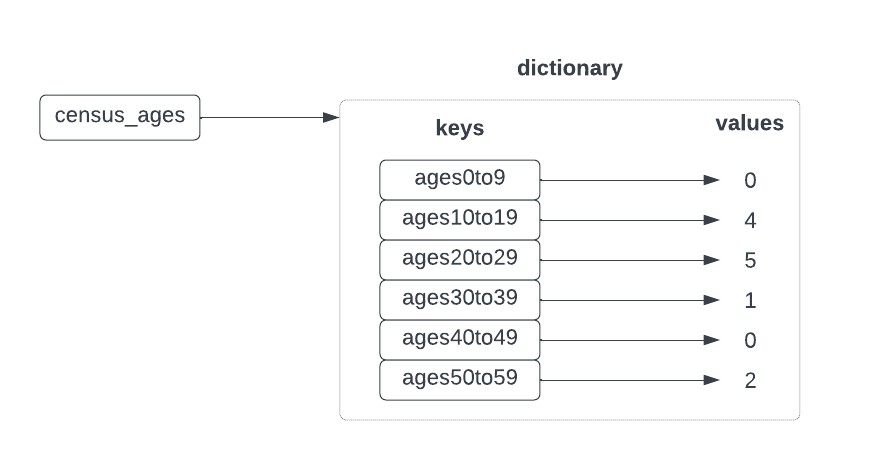Dictionaries, Part 1
- Let’s imagine you have some census data from 1940:

- You get this data in comma-separated value format (CSV)
# last, first, relationship, gender, race, age, marital status, ...
Baer,William,head,M,W,51,M
Baer,Ruth,wife,F,W,38,M
Baer,Robert,son,M,W,12,S
Baer,William,son,M,W,10,S
Sposato,Carolina,head,F,W,53,Wd
Sposato,Albert,son,M,W,23,S
Sposato,Carlo,son,M,W,21,S
Sposato,Antonio,son,M,W,18,S
Sposato,Ralph,son,M,W,10,S
Sposato,Frances,daughter,F,W,28,S
Zappala,Mariano,head,M,W,27,M
Zappala,Anna,wife,F,W,25,M-
You would like to calculate the number of people in the census who are:
- ages 0-9
- ages 10-19
- ages 20-29
- ages 30-39
- ages 40-49
-
and so forth
-
You could create separate variables for each age range:
ages0to9 = 0
ages10to19 = 0
ages20to29 = 0
ages30to39 = 0
ages40to49 = 0- and then use the accumulator pattern, right?

- What you want instead is a dictionary:
- maps keys to values

Creating dictionaries
# create a blank dictionary
age_count = {}
age_count['age0to9'] = 0
age_count['age10to19'] = 0
age_count['age20to29'] = 0
age_count['age30to39'] = 0
age_count['age40to49'] = 0
age_count['age50to59'] = 0
print(age_count) {'age0to9': 0, 'age10to19': 0, 'age20to29': 0, 'age30to39': 0, 'age40to49': 0, 'age50to59': 0}# shorter version
age_count = {'age0to9': 0, 'age10to19': 0, 'age20to29': 0, 'age30to39': 0, 'age40to49': 0, 'age50to59': 0}
print(age_count)
{'age0to9': 0, 'age10to19': 0, 'age20to29': 0, 'age30to39': 0, 'age40to49': 0, 'age50to59': 0}Getting and setting values
# get a value
result = age_count['age20to29']
print(result)
# set a value
age_count['age20to29'] = 5
result = age_count['age20to29']
print(result)
0
5- each value acts like any other variable
- it can have only one value
- if you change it, you overwrite the old value
result1 = age_count['age20to29']
age_count['age20to29'] = 6
result2 = age_count['age20to29']
print(f"count was {result1} now it is {result2}") count was 5 now it is 6Example: Census Count
def census_age_count(filename):- We will do this in class in PyCharm
def census_age_count(filename):
"""
Count ages in the census
:param filename: the name of a file with 1940 census data
:return: a dictionary with counts accumulated by age
>>> census_age_count('census.txt')
{'age0to9': 0, 'age10to19': 4, 'age20to29': 5, 'age30to39': 1, 'age40to49': 0, 'age50to59': 2}
"""
age_count = {'age0to9': 0, 'age10to19': 0, 'age20to29': 0, 'age30to39': 0, 'age40to49': 0, 'age50to59': 0}
with open(filename) as file:
for line in file:
last, first, relationship, gender, race, age, marital_status = line.strip().split(',')
age = int(age)
if age < 10:
age_count['age0to9'] += 1
elif age < 20:
age_count['age10to19'] += 1
elif age < 30:
age_count['age20to29'] += 1
elif age < 40:
age_count['age30to39'] += 1
elif age < 50:
age_count['age40to49'] += 1
elif age < 60:
age_count['age50to59'] += 1
return age_countChecking if a key is in a dictionary
result = age_count['age90to99'] ---------------------------------------------------------------------------
KeyError Traceback (most recent call last)
/var/folders/9x/cb134v3d2nb22_rksynbspqm0000gn/T/ipykernel_54731/704241586.py in <module>
----> 1 result = age_count['age90to99']
KeyError: 'age90to99'result = 0
if 'age90to99' in age_count:
result = age_count['age90to99']
print(result) 0Example: Bad Start
- given a dictionary
mealswhere the key is a ‘breakfast’, ‘lunch’, or ‘dinner’ - the values are foods
- bad start if you didn’t have breakfast or if you had candy for breakfast
def bad_start(meals):def bad_start(meals):
if 'breakfast' not in meals:
return True
if meals['breakfast'] == 'candy':
return True
return False
bad_start({'dinner': 'pizza', 'lunch': 'sandwich'})
bad_start({'dinner': 'pizza', 'breakfast': 'sandwich'})
bad_start({'dinner': 'pizza', 'breakfast': 'candy'}) Truedef bad_start(meals):
if 'breakfast' not in meals or meals['breakfast'] == 'candy':
# if meals['breakfast'] == 'candy' or 'breakfast' not in meals:
return True
return False
def bad_start2(meals):
return 'breakfast' not in meals or meals['breakfast'] == 'candy'
bad_start({'dinner': 'pizza', 'lunch': 'sandwich'})
bad_start({'dinner': 'pizza', 'breakfast': 'sandwich'})
bad_start({'dinner': 'pizza', 'breakfast': 'candy'})
bad_start2({'dinner': 'pizza', 'breakfast': 'sandwich'})
FalseExample: Enkale
- given a dictionary
mealswhere the key is a ‘breakfast’, ‘lunch’, or ‘dinner’ - the values are foods
- if ‘dinner’ has ‘candy’ as a value, change it to kale
- return the dictionary
def enkale(meals):def enkale(meals):
if 'dinner' in meals and meals['dinner'] == 'candy':
meals['dinner'] = 'kale'
return meals
enkale({'dinner': 'candy'}) {'dinner': 'kale'}Example: Is Boring
- given a dictionary
mealswhere the key is a ‘breakfast’, ‘lunch’, or ‘dinner’ - the values are foods
- if lunch and dinner are both present and are the same food, return True
def is_boring(meals):def is_boring(meals):
if 'lunch' in meals and 'dinner' in meals and meals['lunch'] == meals['dinner']:
return True
return False
def is_boring2(meals):
return 'lunch' in meals and 'dinner' in meals and meals['lunch'] == meals['dinner']
is_boring({'dinner': 'pizza', 'lunch': 'pizza'})
is_boring2({'dinner': 'pizza', 'lunch': 'pizza'}) TrueComputing keys
- we have been creating dictionaries like this:
meals = {}
meals['breakfast'] = 'candy'
meals['dinner'] = 'pizza'- or this:
meals = { 'breakfast': 'candy', 'dinner': 'pizza'}- but what if we want to compute the keys?
- given a list of words, find a count of all the words starting with each letter
def count_words_by_starting_letter(words):- we will do this in class using PyCharm
def count_words_by_starting_letter(words):
"""
count all the words starting with each letter
:param words: a list of words
:return: a dictionary that counts all the words starting with each letter
>>> result = count_words_by_starting_letter(['rock', 'paper', 'scissors', 'stone', 'parchment'])
>>> from pprint import pprint
>>> pprint(result)
>>> {'p': 2, 'r': 1, 's': 2}
"""
starting_letters = {}
for word in words:
letter = word[0]
if letter not in starting_letters:
starting_letters[letter] = 0
starting_letters[letter] += 1
return starting_lettersLet’s revisit census_age_count()
- this was our dictionary:
age_count = {'age0to9': 0, 'age10to19': 0, 'age20to29': 0, 'age30to39': 0, 'age40to49': 0, 'age50to59': 0}-
what if we instead want to automatically calculate these?
-
we need a function that turns an age into a key:
def round_to_nearest_10(number):- we will write this in class using PyCharm
def round_to_nearest_10(number):
"""
Round a number down to the nearest 10
:param number: a number
:return: a number rounded down to the nearest 10
>>> round_to_nearest_10(10)
10
>>> round_to_nearest_10(18)
18
"""
remainder = number % 10
return number - remainder-
now we can rewrite
census_age_count()to calculate our keys instead of having to pre-determine what they are -
we will write this in class using PyCharm
def census_age_count2(filename):
"""
Count ages in the census
:param filename: the name of a file with 1940 census data
:return: a dictionary with counts accumulated by age
>>> result = census_age_count2('census.txt')
>>> from pprint import pprint
>>> pprint(result)
{10: 4, 20: 5, 30: 1, 50: 2}
"""
age_count = {}
with open(filename) as file:
for line in file:
last, first, relationship, gender, race, age, marital_status = line.strip().split(',')
age = int(age)
# round by to nearest 10s
age_group = round_to_nearest_10(age)
if age_group not in age_count:
age_count[age_group] = 0
age_count[age_group] += 1
return age_count